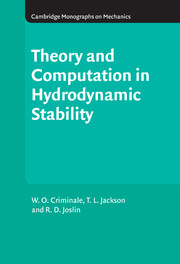Book contents
- Frontmatter
- Contents
- Figures
- Tables
- Preface
- 1 Introduction and problem formulation
- 2 Temporal stability of inviscid incompressible flows
- 3 Temporal stability of viscous incompressible flows
- 4 Spatial stability of incompressible flows
- 5 Stability of compressible flows
- 6 Centrifugal stability
- 7 Geophysical flow
- 8 Transient dynamics
- 9 Nonlinear stability
- 10 Transition and receptivity
- 11 Direct numerical simulation
- 12 Flow control and optimization
- 13 Investigating hydrodynamic instabilities with experiments
- References
- Author index
- General index
5 - Stability of compressible flows
Published online by Cambridge University Press: 06 July 2010
- Frontmatter
- Contents
- Figures
- Tables
- Preface
- 1 Introduction and problem formulation
- 2 Temporal stability of inviscid incompressible flows
- 3 Temporal stability of viscous incompressible flows
- 4 Spatial stability of incompressible flows
- 5 Stability of compressible flows
- 6 Centrifugal stability
- 7 Geophysical flow
- 8 Transient dynamics
- 9 Nonlinear stability
- 10 Transition and receptivity
- 11 Direct numerical simulation
- 12 Flow control and optimization
- 13 Investigating hydrodynamic instabilities with experiments
- References
- Author index
- General index
Summary
Introduction
The consideration of flows when the fluid is compressible presents a great many difficulties. The basic mathematics requires far more detail in order to make a rational investigation. The number of dependent variables is increased. And, regardless of the specific mean flow that is under scrutiny, the boundary conditions can be quite involved. Such observations will become more than obvious as the bases for examining the stability of such flows are established.
By their nature, the physics of compressible flows implies that there are now fluctuations in the density as well as the velocity and pressure. And, the density can be altered by pressure forces and the temperature. As a result, the laws of thermodynamics must be considered along with the equations for the conservation of mass and momentum. Consequently, a new set of governing equations must be derived. Moreover, this set of equations must be valid for flows than range from slightly supersonic to those that are hypersonic; i.e., M, the Mach number defined for the flow is of order one or larger. Flows that are characterized by a Mach number that is small compared to 1 and simply have a mean density that is inhomogeneous are those flows that satisfy what is known as the Boussinesq approximation and will be examined in Chapter 7. Suffice it for now to say that it is the force of gravity that plays a key role in such cases.
- Type
- Chapter
- Information
- Theory and Computation of Hydrodynamic Stability , pp. 132 - 172Publisher: Cambridge University PressPrint publication year: 2003
- 2
- Cited by



